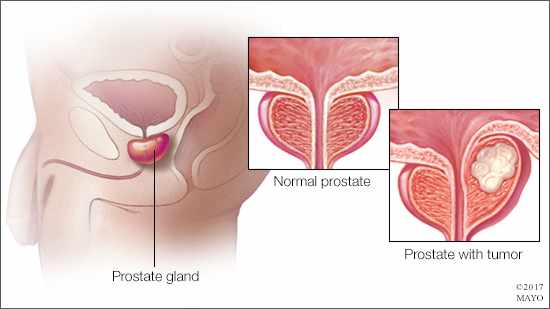-
Cancer
Mayo Clinic Q and A: Who needs prostate cancer screening and when?
 DEAR MAYO CLINIC: At what age should I be screened for prostate cancer? I have read different things about the best time to first have it done.
DEAR MAYO CLINIC: At what age should I be screened for prostate cancer? I have read different things about the best time to first have it done.
ANSWER: There are no hard and fast rules for when men should be screened for prostate cancer. This spring, however, the U.S. Preventive Services Task Force changed its prostate cancer screening recommendation. Previously, the task force recommended against this screening. Now it says the decision to get prostate cancer screening should be made on an individual basis, and men 55 to 69 should discuss with their health care providers if prostate cancer screening is appropriate for them.
Prostate cancer is common. Nearly 1 in 7 American men are diagnosed with prostate cancer during their lives. Prostate cancer is also slow-growing. Most men with prostate cancer don’t die from the disease. However, it is the third-leading cause of cancer deaths among men in the U.S. That makes it an important issue that men should consider.
Health care providers use a blood test called the prostate-specific antigen, or PSA, test to identify prostate cancer in its early stages. PSA is a protein produced by cancerous and noncancerous prostate tissue. A small amount of PSA in the blood is normal.
Prostate cancer cells usually make more PSA than cells that are not cancer. That causes PSA levels in the blood to rise. So a PSA level that’s higher than normal could be a sign of prostate cancer. But PSA levels also can be elevated in men with enlarged or inflamed prostate glands, or for other reasons. That means determining the cause of a high PSA can be complicated.
The previous recommendation — that PSA was not useful as a screening test in healthy men with no symptoms of prostate cancer — was based on the fact that a PSA false positive result can lead to unnecessary tests, such as a prostate biopsy. And those tests come with medical risks.
Also, many cases of prostate cancer progress so slowly that they never require treatment. When those cancers are detected early with PSA screening, however, many men choose to go forward with treatment, such as surgery to remove the prostate gland or radiation, or both. These treatments could cause significant side effects, including impotence and incontinence. In these cases, the effects of treatment may be more harmful than the cancer itself.
The task force’s new recommendation for men 55 to 69 emphasizes that the decision whether to be screened for prostate cancer should consider individual factors, such as personal and family medical history, values, and preferences. For some groups who are known to be at higher risk for developing prostate cancer, including African-American men and men with a family history of the disease, it may be useful to begin screening before age 55.
Some research also has shown that obtaining a baseline PSA measurement from men when they are in their 40s can be helpful to use for comparison when the test is performed in later years. If you’re younger than 55 and interested in knowing your PSA, talk with your health care provider about getting a baseline test.
For men 70 and older, PSA isn’t recommended as a screening tool. However, there are some men with a lack of significant health issues who still might benefit from a prostate check, including a PSA test. This is another reason to discuss it with your health care provider.
If you’re concerned about your risk of developing prostate cancer, make an appointment to talk to your health care provider. He or she can help you sort out the risks and benefits of PSA testing based on your individual situation. — Dr. R. Jeffrey Karnes, Urology, Mayo Clinic, Rochester, Minnesota







